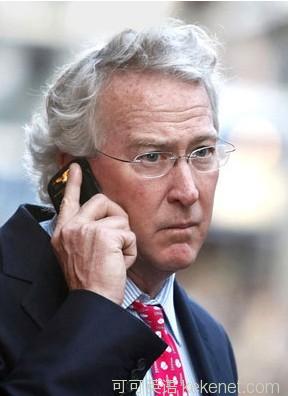
Business
商業(yè)
Chesapeake energy
切薩皮克能源
Caging a wildcat
囚住野貓
Shareholders curb Aubrey McClendon
股東限制奧布里·麥克蘭登的權(quán)力
"WILDCAT" was once American slang for risky business; then it was applied specifically to drilling for oil or gas in virgin land. Either way, it fits Aubrey McClendon, the boss of Chesapeake Energy. Since co-founding the firm in 1989, the tall Oklahoman has overseen the acquisition of vast tracts of land and found oodles of natural gas under it. As Chesapeake became America's second-largest natural-gas producer, Mr McClendon became the face of fracking, a gas-extraction technique hated by greens.
"野貓"本是美國(guó)俚語(yǔ),意指高風(fēng)險(xiǎn)商業(yè)活動(dòng)。后來(lái)專(zhuān)指在未開(kāi)墾的土地上開(kāi)采石油或天然氣。這兩種解釋都適用于切薩皮克能源公司奧布里?麥克蘭登。自從1989年與合伙人一同創(chuàng)立該公司,這個(gè)高大的俄克拉荷馬州人就一直監(jiān)管土地收購(gòu)業(yè)務(wù),使公司獲得了大量土地并在地下發(fā)現(xiàn)了豐富油氣資源。隨著切克披薩成長(zhǎng)為美國(guó)第二大天然氣生產(chǎn)企業(yè),Mr McClendon也成為"水力壓裂"形象代言人,這是一項(xiàng)令環(huán)保人士痛恨的天然氣提取技術(shù)。
More recently Mr McClendon has enraged shareholder activists. On May 1st they clipped his wings. While remaining chief executive, Mr McClendon will give up the chair of Chesapeake to someone independent. Shareholders hope this will stiffen the spine of a boss-friendly board. Mr McClendon will also negotiate the scrapping, by 2014, of a programme by which he was allowed to buy a 2.5% stake in every new well drilled by his company.
最近,Mr McClendon觸怒了股東中的激進(jìn)分子。 這些人于5月1日剝奪了Mr McClendon對(duì)公司的控制權(quán)。盡管保住了首席執(zhí)行官的位子,Mr McClendon還是要將董事長(zhǎng)職位讓位于某個(gè)獨(dú)立的第三方。股東們希望此舉能夠讓原本對(duì)總裁過(guò)于友好的董事會(huì)可以挺起脊梁 。同時(shí),Mr McClendon將商議于2014年廢除一向(激勵(lì))項(xiàng)目,在該項(xiàng)目中Mr McClendon有權(quán)在公司開(kāi)采的所有新油井中占有2.5%的股份。
Mr McClendon has long argued that this unusual arrangement was in the best interests of shareholders. "You could say I'm the only CEO in America who truly participates alongside his company in the day-to-day business activity on the same basis as the company," he told Forbes last year. Presumably he believes that his incentives will now become less well-aligned. Many shareholders disagree.
一直以來(lái),Mr McClendon堅(jiān)持認(rèn)為這項(xiàng)不尋常的安排是為了實(shí)現(xiàn)股東的最大利益。去年在福布斯的采訪中,Mr McClendon說(shuō)"你可是說(shuō)我是美國(guó)唯一一個(gè)真正參與公司日常商業(yè)事務(wù),并與公司站在同一立場(chǎng)的CEO。"事到如今,大概他也認(rèn)為這項(xiàng)激勵(lì)措施使他與公司的立場(chǎng)并不一致。(可是)許多股東對(duì)這一點(diǎn)并不認(rèn)可。
As Chesapeake has grown, so has Mr McClendon's appetite for debt to finance his stakes in wells. (To avoid cherry-picking, he was obliged to invest in all of each year's new ones, or none at all.) In the first year of the programme, according to the Wall Street Journal, the firm drilled 19 wells; last year it was around 1,700, and Mr McClendon had to stump up over $457m.
切薩皮克能源公司的逐步發(fā)展,Mr McClendon對(duì)資本的胃口也越來(lái)越大,他不斷通過(guò)借貸來(lái)為購(gòu)買(mǎi)油井股票融資。(為了避免挑選行為惹人注目,他不得不對(duì)每年的新開(kāi)發(fā)的天然氣井全部投資或者全都不投)。據(jù)華爾街日?qǐng)?bào)報(bào)道,在該項(xiàng)激勵(lì)計(jì)劃實(shí)施的第一年,公司開(kāi)發(fā)了19個(gè)天然氣井,到2011年,公司天然氣井?dāng)?shù)量約為1700個(gè),Mr McClendon為此需要支付4.57億美元。
He did this mostly by borrowing: he admits to personal debts of $846m. In 2008, as natural-gas prices plunged along with the firm's market capitalisation, he had to sell most of his shares in Chesapeake to repay debts. The following June, the board gave him a special $75m bonus to invest in the well programme, while suspending the requirement that he own shares in the firm worth five times his annual salary. This generous move was what first stoked the ire of shareholder activists.
Mr McClendon主要靠借貸來(lái)支付這筆錢(qián),他承認(rèn)自己負(fù)有高達(dá)8.46億美元的個(gè)人債務(wù)。2008年,隨著市值縮水天然氣價(jià)格大跌,他不得不賣(mài)掉自己持有的大部分公司股票來(lái)償還債務(wù)。2009年6月,董事會(huì)撥給他價(jià)值7500萬(wàn)美元的特殊津貼來(lái)投資天然氣井項(xiàng)目,同時(shí),他必須持有相當(dāng)于其年工資五倍的公司股票的這一強(qiáng)制要求也被取消。這種大方的舉動(dòng)第一次激怒了股東中的激進(jìn)分子。
Hedge funds short-selling Chesapeake's shares talk of "red flags" that suggest trouble ahead. For example, the board is looking into reports that Mr McClendon borrowed money from financial firms that had a business relationship with Chesapeake. The firm also disclosed that the taxman was looking at the well programme as part of an audit. On May 2nd, Mr McClendon complained that "a great deal of misinformation" has been published.
對(duì)沖基金賣(mài)空切薩皮克股票被人們視為"前方危險(xiǎn)"的警告。例如,董事會(huì)正在調(diào)查的一份報(bào)告指出:Mr McClendon從一些與切薩皮克公司有業(yè)務(wù)關(guān)系的金融公司借款。切薩皮克公司也披露稅務(wù)部門(mén)正打算將油氣井激勵(lì)計(jì)劃(涉及的資產(chǎn))納入審計(jì)范圍。5月2日,McClendon對(duì)此表示不滿,聲稱(chēng)公開(kāi)報(bào)道中含有"大量虛假信息"。
To have a boss with such big debts looks risky. Did the board know the details? This much is clear: neither the board nor shareholders can claim they were unaware of the programme that let Mr McClendon invest in new wells, which has existed since the firm went public in 1993.
公司總裁負(fù)債累累,這看上去不妙。董事會(huì)是否了解其中細(xì)節(jié)?答案很明顯:董事會(huì)和股東都無(wú)法宣稱(chēng)他們對(duì)這項(xiàng)允許McClendon投資新油井的激勵(lì)計(jì)劃毫不知情,(事實(shí)上)自從1993年公司上市,該計(jì)劃就已經(jīng)存在了。
As the forthcoming flotation of Facebook may show, investors are often willing to overlook weak corporate governance when offered the chance to buy shares in a newly listed firm run by a brilliant entrepreneur. The turmoil at Chesapeake should remind them:caveat emptor.
FACEBOOK上市前的一系列事件也許可以反映出投資者的誤區(qū)——當(dāng)一家由天才企業(yè)家經(jīng)營(yíng)的公司剛剛上市時(shí),投資者在獲得機(jī)會(huì)購(gòu)買(mǎi)該公司股票的同時(shí)卻忽視了公司管理中的薄弱之處。發(fā)生在切薩皮克能源公司的混亂局面也是對(duì)這類(lèi)投資者們的提醒:一經(jīng)出售,概不負(fù)責(zé)。



